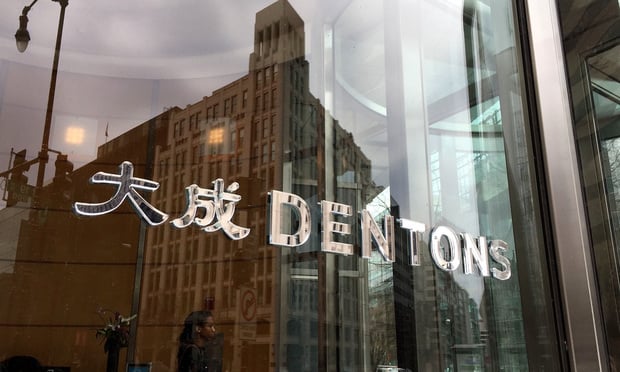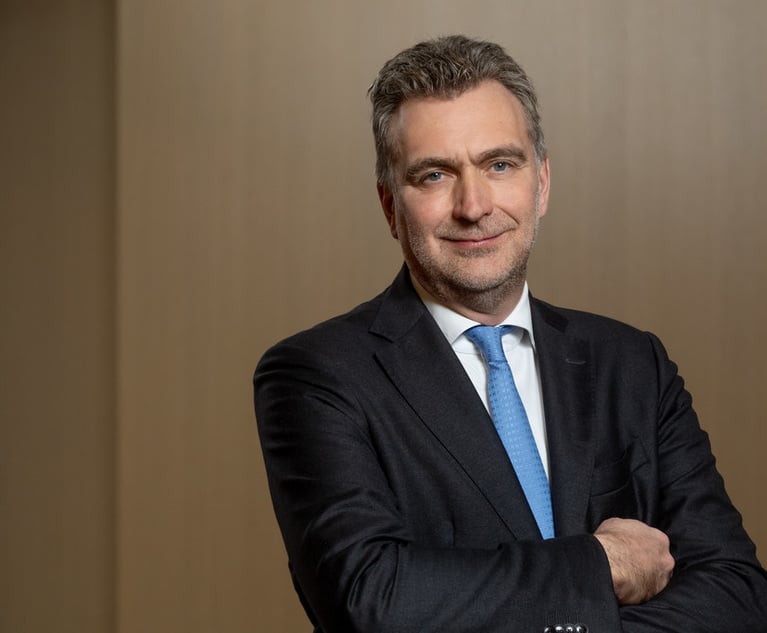Questions Remain Over Dentons' Seoul Office as Legal Giant Combines With Korean Firm
Both Dentons and Lee International said the combination is not a joint venture. Lee International also said it will not integrate with Dentons' 6-year-old foreign legal consultant office in Seoul.
August 13, 2019 at 04:32 AM
4 minute read
 Photo: Diego M. Radzinschi/ALM
Photo: Diego M. Radzinschi/ALM
As Dentons prepares to combine with a mid-sized South Korean firm, questions remain over the future of the global legal giant's six-year-old Seoul office.
Last week, Dentons announced it was combining with Lee International, a Seoul-based domestic firm with about 30 lawyers. Meanwhile, Dentons already operates in Seoul as a foreign law practice with the office it inherited from predecessor firm McKenna Long & Aldridge after the firms merged in 2015.
In a statement, Dentons said the combination will give it the ability to practise Korean law. Under Korean regulations, global firms can have access to the Korean market by opening a foreign legal consultant office in Seoul—which cannot offer Korean law advice—or through an alliance with a local firm. The only way a global firm can directly practise Korean law is by forming a joint venture with a local firm. Both Dentons and Lee International confirmed that the combination is not a joint venture.
So far, none of the 28 foreign firms in Korea have a joint venture, partially because it is too restrictive and unfavourable to them—the foreign firm would have to be solely responsible for 100% of the joint venture while only being able to own 49% of it.
According to Dentons' website, the Seoul office has two partners: Andrew Park and Song Jung. Both are intellectual property specialists who also spend time in Washington, D.C. Park opened the Seoul office in 2013 for McKenna Long as the legacy U.S. firm's first office in Asia and has since been managing the outpost. In December, Park advised Korean supermarket chain E-Mart Inc. on IP and technology matters on a $275 million acquisition of U.S. food retailer Good Food Holdings.
The representative attorney of Lee International, Park Sung-duck, said his firm will not be integrated with Dentons' Seoul office. Instead, Lee International is merely joining the Dentons group, he said, which is organised in a Swiss verein structure.
A Washington, D.C.-based spokesperson for Dentons said it intends to have only one office in Seoul. But the Lee International combination will give Dentons two offices: Lee International's and legacy McKenna Long's.
Dentons' spokesperson said the firm is in discussions with regulators about how to manage its foreign licence and local presence in Korea. Changes made to a foreign legal consultant office in Seoul require approval by the Korean authorities. An official at the international legal affairs division of the Korean Ministry of Justice, who manages the foreign legal consultant offices, said the government was not informed of the specifics of the combination between Dentons and Lee International.
Dentons' Park declined to comment on whether his Seoul office will close. Dentons' Washington, D.C.-based global chairman, Joseph Andrew, and global CEO, Elliott Portnoy, did not respond to requests for comment. The firm's spokesperson said the firm will not discuss future plans until the partner vote regarding the combination with Lee International is completed, which is expected to happen in the next few months.
At least two international firms opted to form alliances with Korean firms instead of opening an office in Seoul, as they get access to the Korean market without making a significant commitment on the ground. Bird & Bird has a non-exclusive partnership with HMP Law, while Taylor Wessing has an exclusive alliance with DR & AJU; both alliances were formed in 2014.
So far, two global firms have closed their Seoul offices. McDermott Will & Emery, which was among the first global firms to set up a Seoul office in 2012, withdrew from Korea last month. And last November, Simpson Thacher & Bartlett, which was also part of the 2012 wave, shuttered its Seoul office and relocated its Korea practice back to Hong Kong.
Asia's fourth-largest economy is still an attractive market for global firms. Two U.S. firms recently set up shop in Seoul. Arnold & Porter Kaye Scholer and Shearman & Sterling opened in February and November, respectively.
Related Stories:
Dentons to Combine With South Korean Firm
McDermott Will & Emery Closes Seoul Office
Simpson Thacher to Become First Global Firm to Close Seoul Office
This content has been archived. It is available through our partners, LexisNexis® and Bloomberg Law.
To view this content, please continue to their sites.
Not a Lexis Subscriber?
Subscribe Now
Not a Bloomberg Law Subscriber?
Subscribe Now
NOT FOR REPRINT
© 2025 ALM Global, LLC, All Rights Reserved. Request academic re-use from www.copyright.com. All other uses, submit a request to [email protected]. For more information visit Asset & Logo Licensing.
You Might Like
View All

Jones Day, BCLP & Other Major Firms Boost European Teams with Key Partner Hires
4 minute read
$13.8 Billion Magomedov Claim Thrown Out by UK High Court
Trending Stories
- 1South Florida Attorney Charged With Aggravated Battery After Incident in Prime Rib Line
- 2'A Death Sentence for TikTok'?: Litigators and Experts Weigh Impact of Potential Ban on Creators and Data Privacy
- 3Bribery Case Against Former Lt. Gov. Brian Benjamin Is Dropped
- 4‘Extremely Disturbing’: AI Firms Face Class Action by ‘Taskers’ Exposed to Traumatic Content
- 5State Appeals Court Revives BraunHagey Lawsuit Alleging $4.2M Unlawful Wire to China
Who Got The Work
J. Brugh Lower of Gibbons has entered an appearance for industrial equipment supplier Devco Corporation in a pending trademark infringement lawsuit. The suit, accusing the defendant of selling knock-off Graco products, was filed Dec. 18 in New Jersey District Court by Rivkin Radler on behalf of Graco Inc. and Graco Minnesota. The case, assigned to U.S. District Judge Zahid N. Quraishi, is 3:24-cv-11294, Graco Inc. et al v. Devco Corporation.
Who Got The Work
Rebecca Maller-Stein and Kent A. Yalowitz of Arnold & Porter Kaye Scholer have entered their appearances for Hanaco Venture Capital and its executives, Lior Prosor and David Frankel, in a pending securities lawsuit. The action, filed on Dec. 24 in New York Southern District Court by Zell, Aron & Co. on behalf of Goldeneye Advisors, accuses the defendants of negligently and fraudulently managing the plaintiff's $1 million investment. The case, assigned to U.S. District Judge Vernon S. Broderick, is 1:24-cv-09918, Goldeneye Advisors, LLC v. Hanaco Venture Capital, Ltd. et al.
Who Got The Work
Attorneys from A&O Shearman has stepped in as defense counsel for Toronto-Dominion Bank and other defendants in a pending securities class action. The suit, filed Dec. 11 in New York Southern District Court by Bleichmar Fonti & Auld, accuses the defendants of concealing the bank's 'pervasive' deficiencies in regards to its compliance with the Bank Secrecy Act and the quality of its anti-money laundering controls. The case, assigned to U.S. District Judge Arun Subramanian, is 1:24-cv-09445, Gonzalez v. The Toronto-Dominion Bank et al.
Who Got The Work
Crown Castle International, a Pennsylvania company providing shared communications infrastructure, has turned to Luke D. Wolf of Gordon Rees Scully Mansukhani to fend off a pending breach-of-contract lawsuit. The court action, filed Nov. 25 in Michigan Eastern District Court by Hooper Hathaway PC on behalf of The Town Residences LLC, accuses Crown Castle of failing to transfer approximately $30,000 in utility payments from T-Mobile in breach of a roof-top lease and assignment agreement. The case, assigned to U.S. District Judge Susan K. Declercq, is 2:24-cv-13131, The Town Residences LLC v. T-Mobile US, Inc. et al.
Who Got The Work
Wilfred P. Coronato and Daniel M. Schwartz of McCarter & English have stepped in as defense counsel to Electrolux Home Products Inc. in a pending product liability lawsuit. The court action, filed Nov. 26 in New York Eastern District Court by Poulos Lopiccolo PC and Nagel Rice LLP on behalf of David Stern, alleges that the defendant's refrigerators’ drawers and shelving repeatedly break and fall apart within months after purchase. The case, assigned to U.S. District Judge Joan M. Azrack, is 2:24-cv-08204, Stern v. Electrolux Home Products, Inc.
Featured Firms
Law Offices of Gary Martin Hays & Associates, P.C.
(470) 294-1674
Law Offices of Mark E. Salomone
(857) 444-6468
Smith & Hassler
(713) 739-1250









